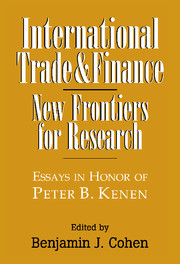Book contents
- Frontmatter
- Contents
- List of contributors
- Introduction
- 1 The practical theorist: Peter Kenen's contribution to international economics
- I International trade theory
- 2 Nature, capital, and trade: A second look
- 3 The Meade model of preferential trading: History, analytics and policy implications
- 4 International trade and big government
- II International monetary theory
- III Applied policy analysis
- Index
4 - International trade and big government
Published online by Cambridge University Press: 11 September 2009
- Frontmatter
- Contents
- List of contributors
- Introduction
- 1 The practical theorist: Peter Kenen's contribution to international economics
- I International trade theory
- 2 Nature, capital, and trade: A second look
- 3 The Meade model of preferential trading: History, analytics and policy implications
- 4 International trade and big government
- II International monetary theory
- III Applied policy analysis
- Index
Summary
Introduction
What sets international economics apart as a separate field of study within economics? That is the question with which Peter Kenen would start his lectures on international trade at Princeton. His answer remains vivid in this author's mind after fifteen years: what is special about international economics is that it deals with economic transactions between sovereign entities.
As Kenen explained, sovereignty has a number of important implications for the study of economics. The most obvious is that governments impose restrictions on the mobility of goods, services, and factors of production across their national borders. Countries also differ in their tax/trade/regulatory regimes, so that such restrictions operate asymmetrically. Moreover, these policies are endogenous to the nature of international economic interactions faced by sovereign entities. Governments respond to the opportunities, pressures, and challenges posed by international economic integration. Indeed, the study of this interdependence between policy and resource allocation constitutes the core of international economics.
This essay documents one little-known but significant way in which governments have apparently responded to international integration: exposure to foreign trade is strongly and positively correlated with the size of government (as a share of GDP). Governments in more open economies tend to consume, transfer, and invest a higher share of national income. This relationship holds both for the OECD countries and a larger sample of countries exceeding 100 in number. Moreover, openness in the early 1960s is a statistically significant predictor of the expansion of the government sector over the following three decades.
- Type
- Chapter
- Information
- International Trade and FinanceNew Frontiers for Research, pp. 89 - 122Publisher: Cambridge University PressPrint publication year: 1997
- 2
- Cited by



